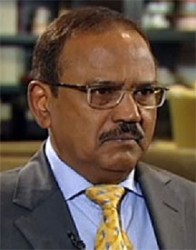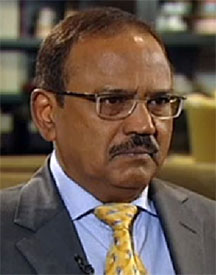NEW DELHI, (Reuters) – India’s new Prime Minister Narendra Modi has chosen a daring former spy with years of experience in dealing with Pakistan as his national security adviser, a move officials say signals a more muscular approach to New Delhi’s traditional enemy.

The choice of Ajit Doval, alongside former Indian army chief General V.K. Singh as a federal minister for the northeast region, underscores plans to revamp national security that Modi says became weak under the outgoing government.
The two top-level appointments, reporting directly to Modi, point to a desire to address what are arguably India’s two most pressing external security concerns – Pakistan and China, both of which, like India, have nuclear arms.
Doval, a highly decorated officer renowned for his role in dangerous counter-insurgency missions, has long advocated tough action against militant groups, although operations he has been involved in suggest a level of pragmatism.
In the 1980s, he smuggled himself into the Golden Temple in the city of Amritsar from where Sikh militants were later flushed out, and he infiltrated a powerful guerrilla group fighting for independence from India in the northeastern state of Mizoram. The group ultimately signed a peace accord.
Doval was also on the ground in Kandahar, Afghanistan, when an Indian Airlines plane from Kathmandu was hijacked by Pakistan-based militants on Christmas Eve, 1999. The crisis was resolved when top militants were freed in exchange for hostages.
“Doval is an out-of-the-box thinker,” said an Intelligence Bureau officer with long years of service in Kashmir and other Indian hotspots. “Expect him to shake things up.”
The official, who did not want to be named, said he expected the new security team to push for a rapid expansion of border infrastructure and a streamlining of intelligence services, which still function in isolation and often impede one other.
Singh has declared his priority is to develop the northeast in order to narrow the gap with Chinese investment in roads and railways on its side of the frontier.
India is also creating a new mountain corps and beefing up border defences, although that initiative has stalled.
FEARS OF AFGHAN SPILLOVER
A secure India is a long-standing goal of Modi’s Hindu nationalist Bharatiya Janata Party (BJP), and the new prime minister himself wants strong borders so the country can focus fully on giving economic growth a much-needed boost.
He won the election in May in a landslide victory largely on economic pledges that India’s 1.2 billion people hope will secure jobs and raise living standards.
But with most foreign troops withdrawing from Afghanistan by the end of this year, India is concerned that Islamist militants fighting there will turn their sights towards the disputed region of Kashmir, which is also claimed by Pakistan.
India and Pakistan have fought two of three wars since independence over the Himalayan territory, and their armed forces are separated there by a rugged, mountainous Line of Control which militants have the capability to cross.
Doval, 69, formerly head of the Intelligence Bureau domestic spy agency, will be National Security Adviser, only the second officer from the intelligence community to hold the post.

